Category Archive for Netherlands
Amsterdam’s Weirdest, Strangest Museums! KattenKabinet cat museum, Dutch cocktail making & tasting tours.
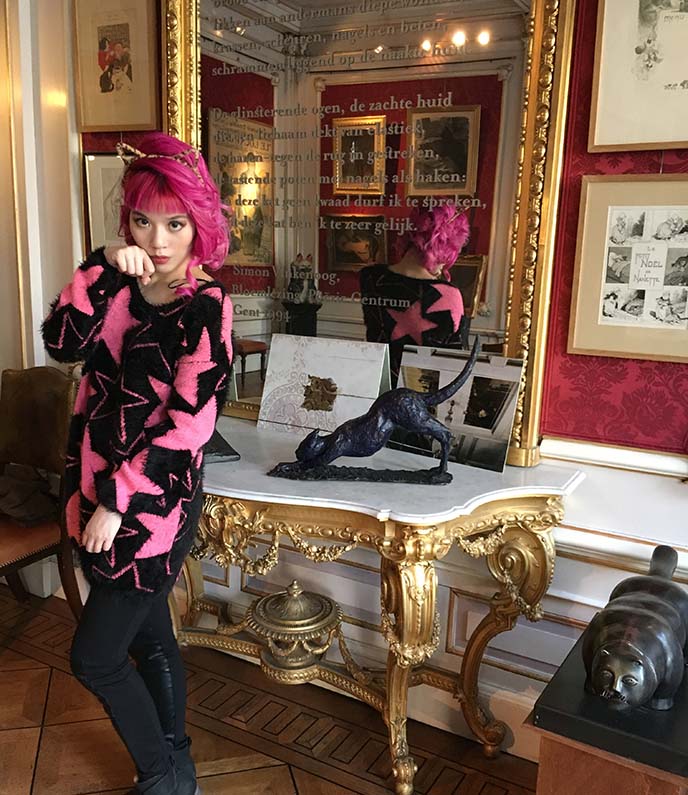
Meow from Amsterdam! Welcome to my adventures in the Dutch capital.
One glance at my blog, and you know that I love all things bizarre, unusual and quirky.
To my delight, Amsterdam has museums that veer gloriously into this territory… including a cat-themed museum, Katten Kabinet!

As a cocktail-lover, I also adored the creative, interactive tours at The House of Bols and Wynand Fockink. My friends and I got to taste Dutch spirits, and mix our own cocktails.
Ready to explore Amsterdam with me? Read on for a prowl inside the cat museum, and then we’ll get tipsy.

I teamed up with I Amsterdam, and they put together an itinerary that was tailored to my offbeat interests. (How do you like my flying outfit?)
I had a smooth direct flight from Vancouver to Schiphol Airport on KLM, the Dutch blue airlines known for its comfortable service. They’re one of my personal favorites, and even sell a Miffy bunny toy dressed in a flight attendant uniform.
● Outfit Details ● I’m wearing MySwear customized Hoxton creepers from Farfetch, which I designed to be shiny pink with an LC monogram. I’m towing this pink Samsonite suitcase, and you can see more photos of my faux fur coat here.
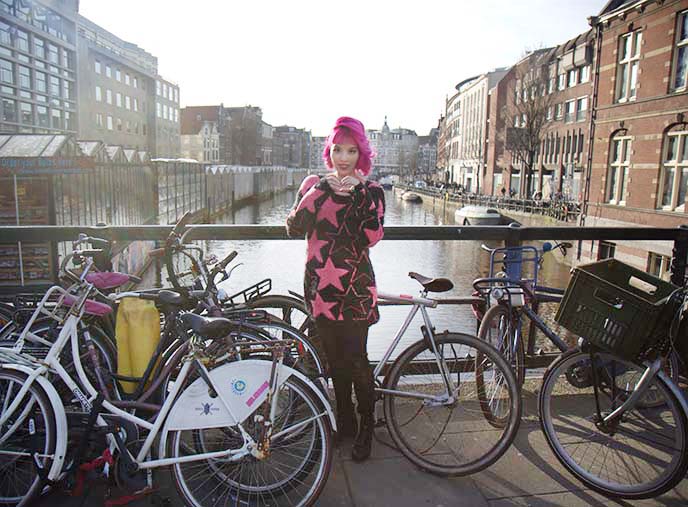
Before long, I was strolling through Amsterdam, a city known for its iconic bicycles and canals. Spring-time is also a great time to visit, as the weather is warming up but the tourists have yet to arrive.
● I’m wearing a sweater that belonged to my friend Rose — but you can find a similar star sweater by Wildfox (also sold in white), and a pink knit top with stars by Acne. Check out more below:
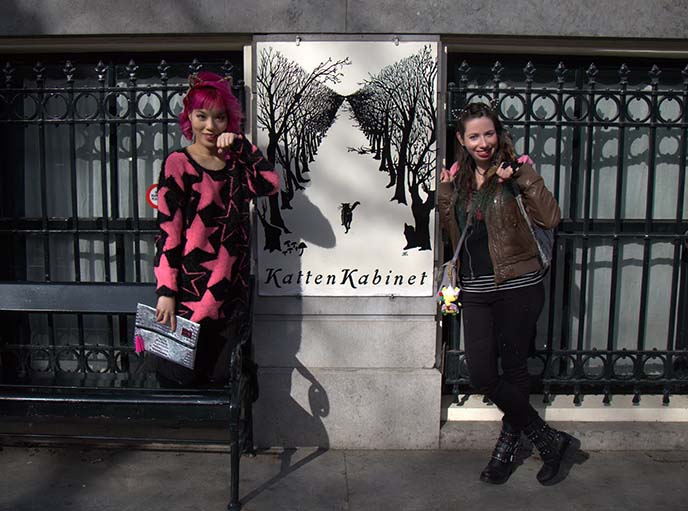
I reunited with my local friend Leyla, who runs LeylaFashion blog. (Remember when we visited the Miffy museum in Utrecht together?) Together with photographer Arina Dresviannikova, we were ready for an epic girls trip.
The fun started at KattenKabinet, a cat-themed museum. My friends and I donned pointy-eared headbands, and walked over to the centrally-located building that looks over the canals. (Address: Herengracht 497, 1017 BT, Amsterdam, Netherlands).
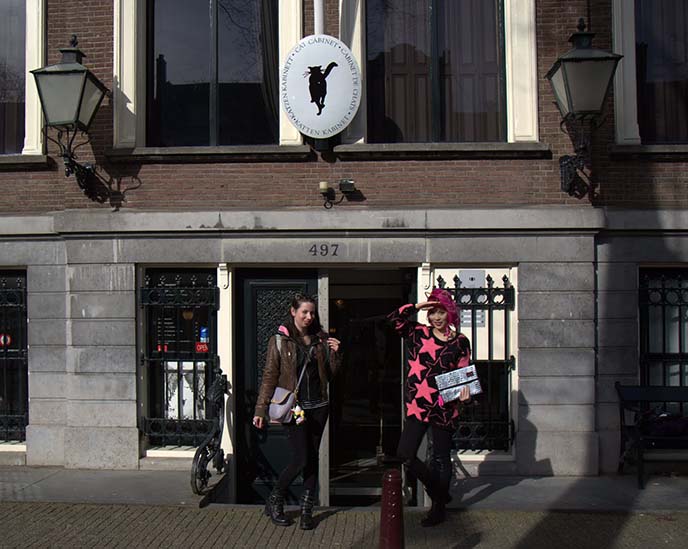
The black kitty sign beckoned us to enter.
(Watch Leyla’s travel vlog about Katten Kabinet to see us exploring).
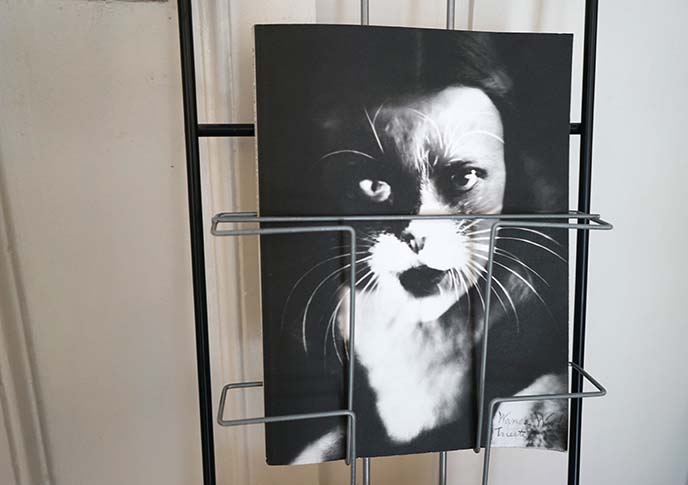
Most tourists stick to the popular attractions (Anne Frank House, Rijksmuseum), but I was keen to get off the beaten path, and discover a lesser-known collection — featuring nothing but cats.
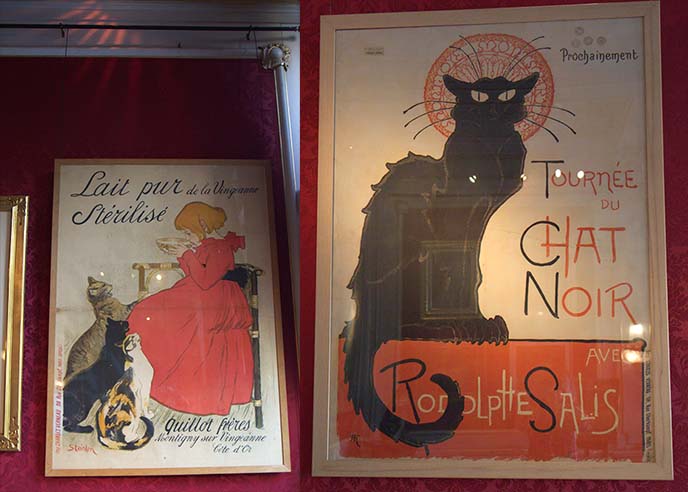
The museum is small (two floors) but the cat artwork is beautifully presented, with original pieces by masters including Pablo Picasso, Rembrandt, and Henri de Toulouse-Lautrec.
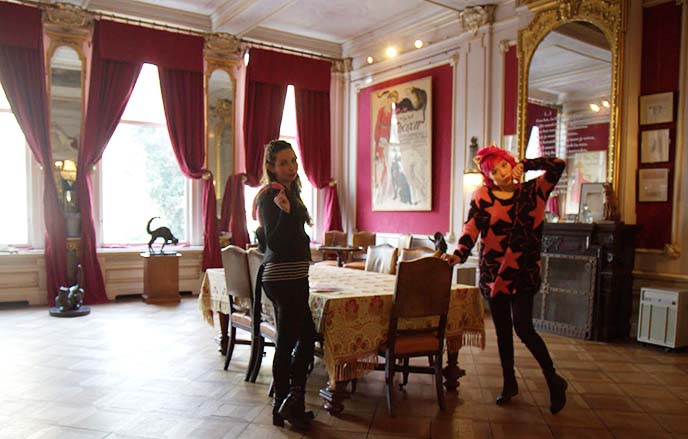
We went up a winding staircase, and found ourselves in this Baroque-style room finished in red and gold.
This collection of cat-themed objects is not at all kitschy or tacky. The works are masterpieces, carefully chosen and arranged in royal style.
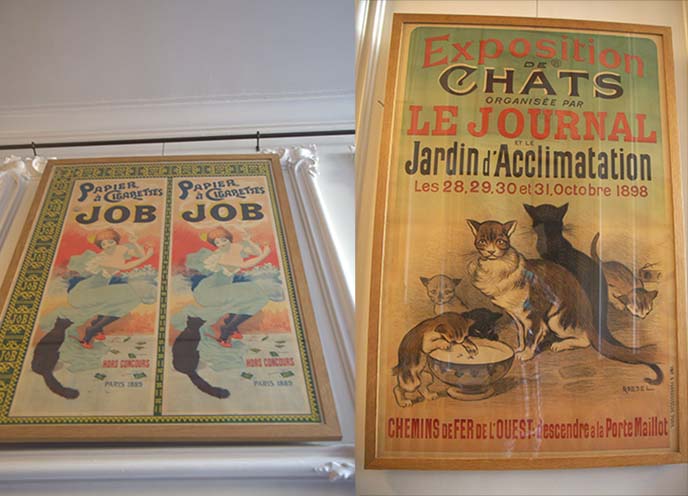
KattenKabinet was founded in 1990 by Bob Meijer, in memory of his red tomcat John Pierpont Morgan (named after the American banker J. P. Morgan). To this day, Meijer and his family live in the upper floors of this house.
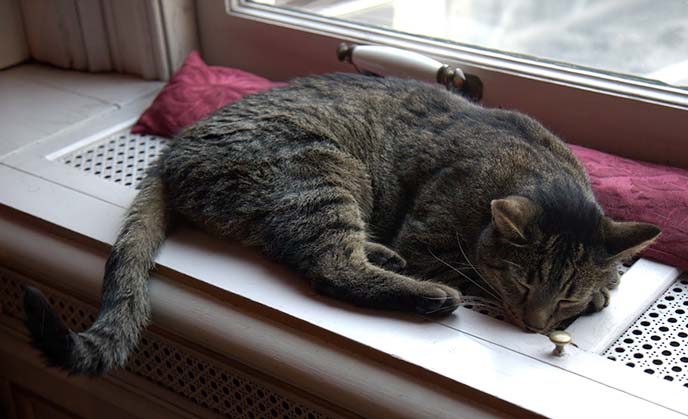
Several of his cats roam freely through the rooms. At first, we weren’t sure if this lazy fellow was real, or a stuffed kittycat!
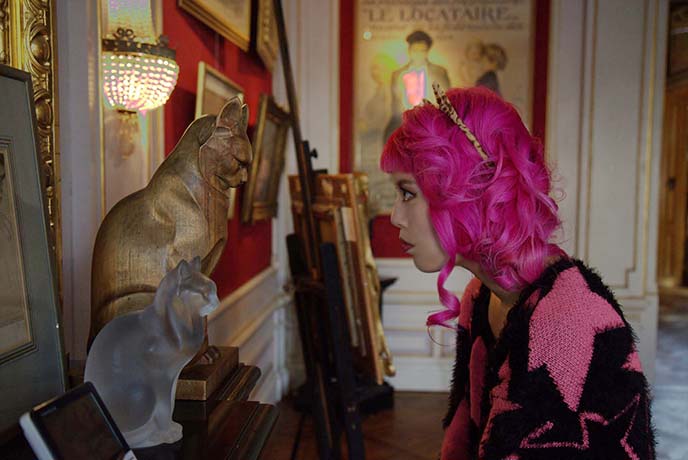
Katten Kabinet’s collection includes depictions of all types of cats (various species, colors), in a variety of mediums. I had a stare-down with this grumpy gold statue.
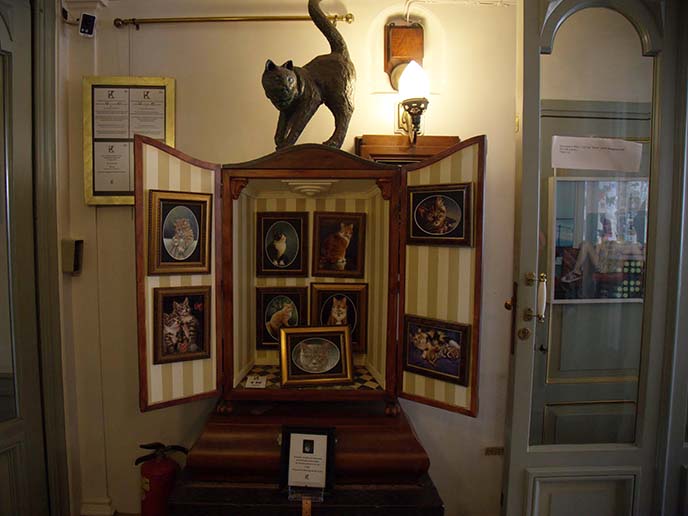
Many of the works are from the family’s personal collection, which gives De KattenKabinet a pleasingly non-commercial feeling.
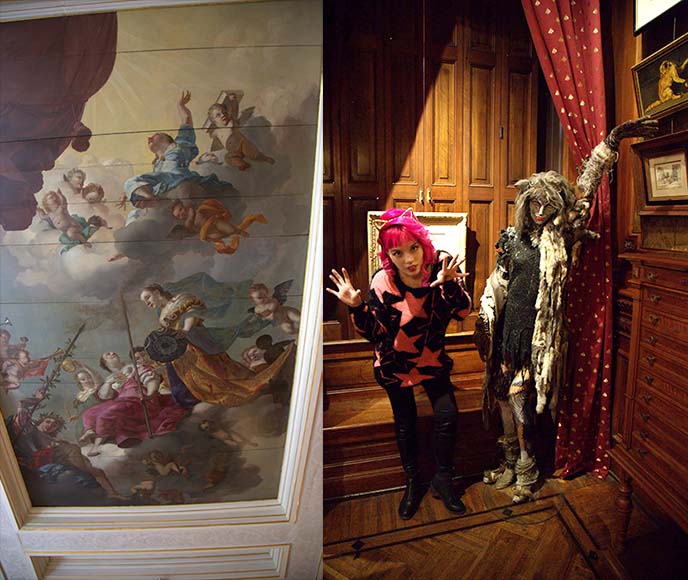
This classic Amsterdam house once belonged to a 17th century merchant. Look up, and you’ll see a restored ceiling painting from this era.
However, there are contemporary works as well. In one corner, I found a spectacular costume from Andrew Lloyd Webber’s “Cats” musical.
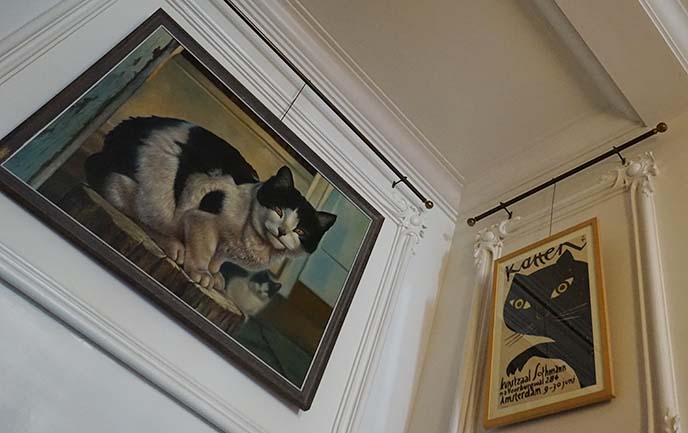
Without taking itself too seriously, the Cat Cabinet lets visitors learn about the role of felines in culture, over the centuries. These works range from advertisements for household products, to fine porcelain figures.
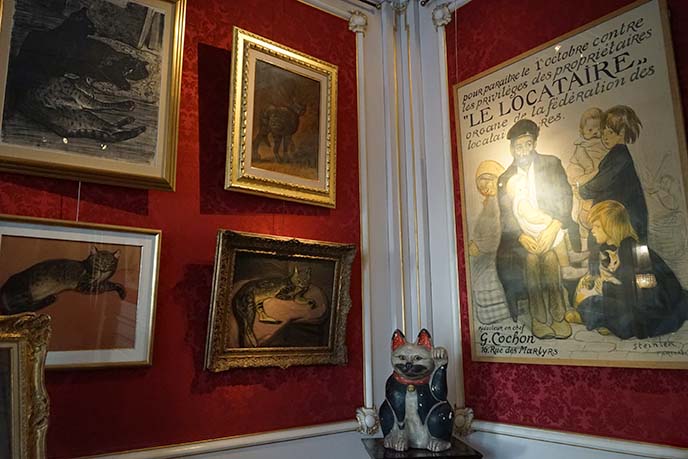
The gallery has partnered with famous museums like the Van Gogh, in order to present special works by famous artists. The “Cat-A-Logue” includes pieces from all over the world, such as this antique Chinese lucky cat statue.
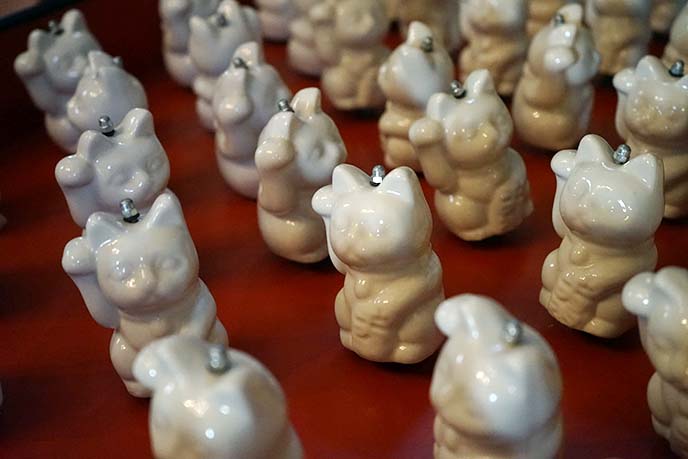
You can’t help but smile as you walk through the exhibitions. I’ve never seen so many cats in one place!
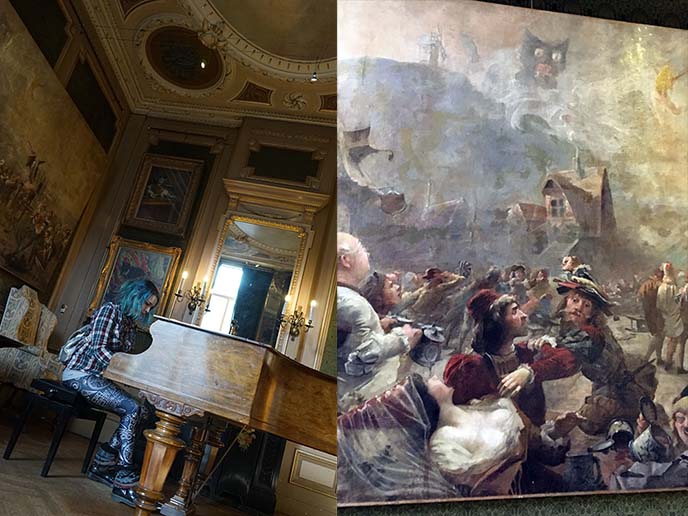
Arina played a few songs on the grand piano. Behind her, it took us a minute to find out why this sprawling painting was cat-related.
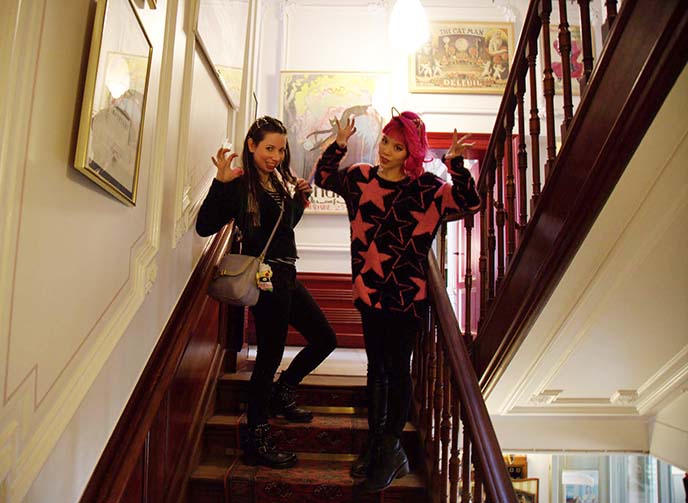
Movie buffs may recognize this as a filming location for “Ocean’s Twelve.”
(If you like my star sweater, click for more designs below:)
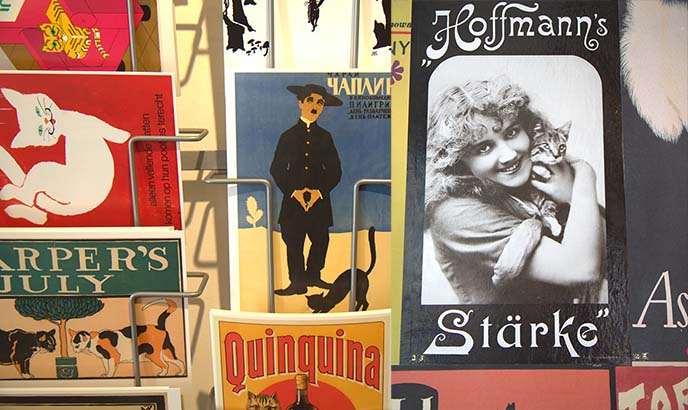
The gift shop is just as joyful. The perfect place to pick up a unique souvenir for a cat enthusiast.
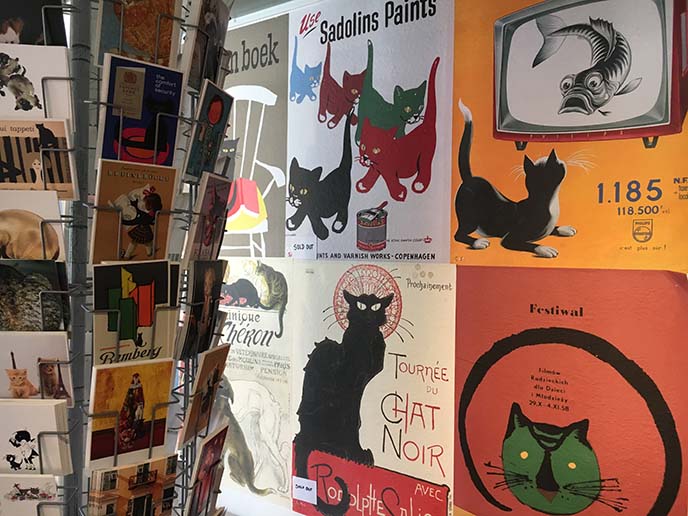
Isn’t the wide range of kitty-designs inspiring?
If you’re a fellow cat-lady, come on down to KattenKabinet. This funny Amsterdam museum has our paw-stamp of approval.
(You can watch Leyla’s video about our day here and above.)
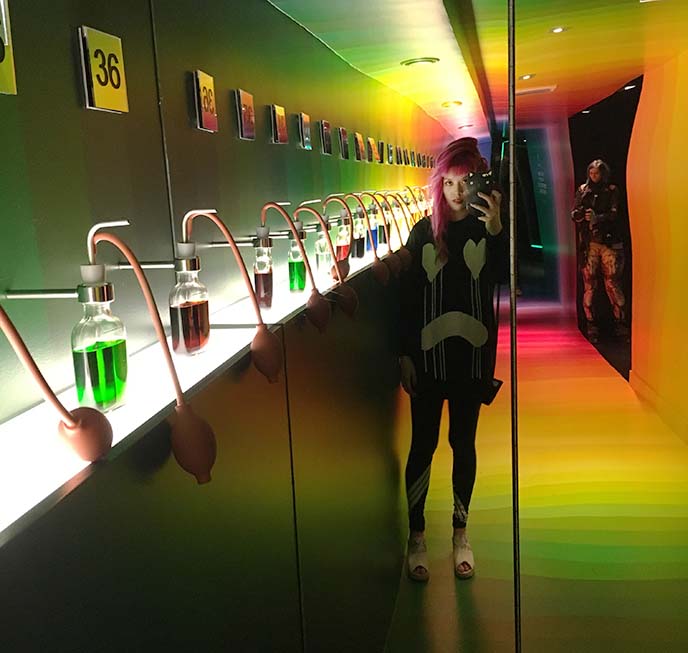
Now, let’s get trippy at The House of Bols! Once more, this is not a typical museum. Bols is better described as an interactive cocktail / liqueur experience for all five senses.
(I’m wearing this Long Clothing Drippy sweatshirt with side pockets.)
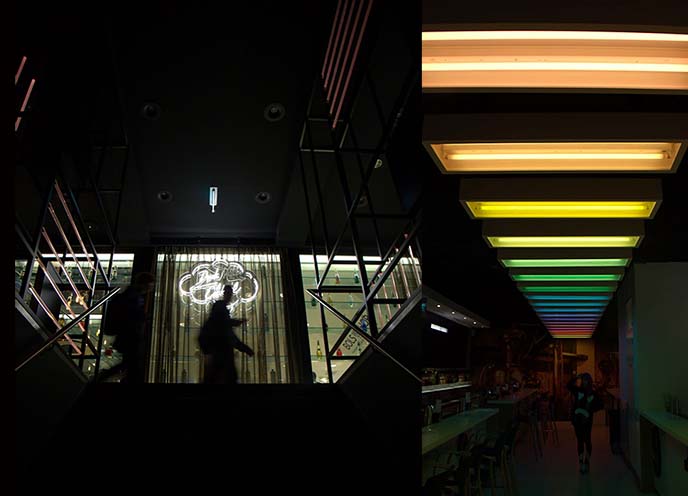
House of Bols is located on Amsterdam’s Museumplein — where the major museums are — and was recently renovated. (Address: Paulus Potterstraat 14, 1071 CZ Amsterdam, Netherlands)
The new design is modern and intriguingly lit, and each room is designed to stimulate the senses. In the rainbow-colored “hall of taste,” I got to squeeze the bottles and guess the liqueur aromas, ranging from green apple to butterscotch.
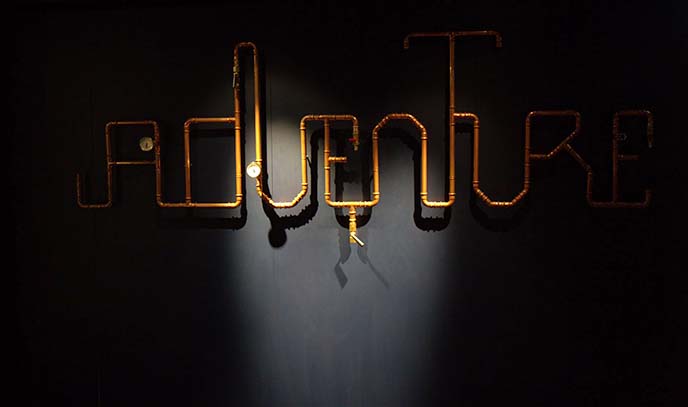
Using various media (video, sound, sculpture, photography), the museum tells the story of the Bols family, who started producing bottles of liqueur in 1575. Lucas Bols is the world’s oldest distilled spirits brand, and remains popular worldwide today.
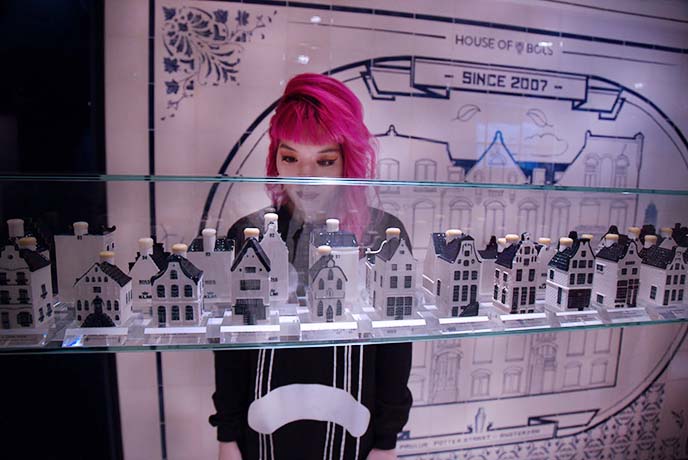
Bols currently has 48 creatively flavored spirits, as well as genever: the neutral or juniper-flavored national liquor of the Netherlands. This is a 35% alcohol that can be a bit similar to gin, and ideal for mixing cocktails.
I thought these blue houses were toys, but they actually are bottles with a cork on top — and contain Dutch Genever!
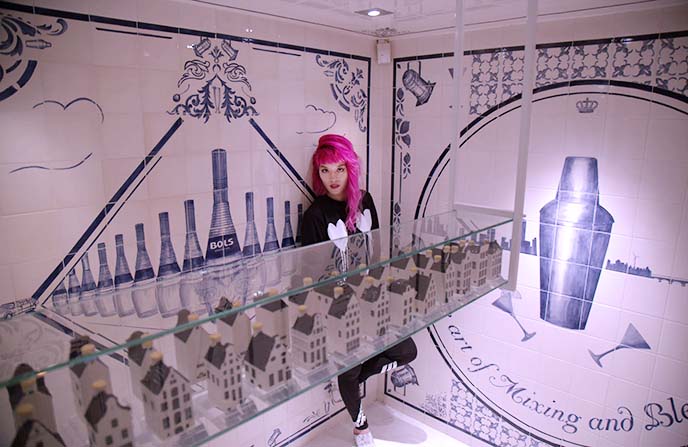
Starting in 1952, KLM Airlines has given these “Delft Blue Houses” to business and royal class travellers. There are 96 different styles, and collectors are keen to have one of each.
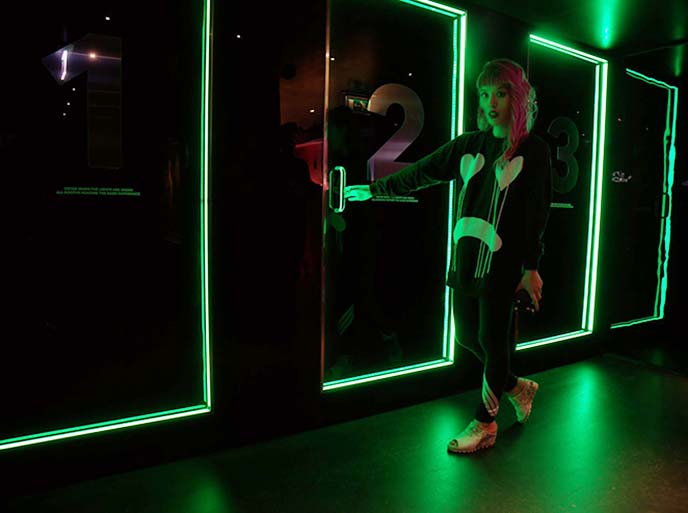
What lies behind Door #2? I received a small jar of liqueur, and went inside to find out.
Suddenly, I was transported into an interactive experience called “The Art of Flavour.” Lights flashed and swirled, the floor buzzed, and music played. The taste on my tongue shifted along with these sensory changes — amazing.

In the distillery room, I learned about the extraction process and distillation of flavors. The Bols portfolio includes more than 20 brands including liqueurs, genever, gin and vodka.

Guests are encouraged to dip their hands into these bins, and smell the various natural ingredients that go into the century-old recipes.
The 48 infusions include berries, fruits, herbs and botanicals. Ginger, peppermint, blueberries, dates, amaretto, and more.

The final stop: Bols’ Mirror Bar. You can ask the professional bartenders to shake you a delicious cocktail (they are graduates of a special in-house training program)… or create one yourself.
I chose the latter, so I picked and printed out a cocktail recipe on the touch screen. I selected the “Dutch n Stormy,” which combines fresh lime and ginger beer with genever (instead of rum).
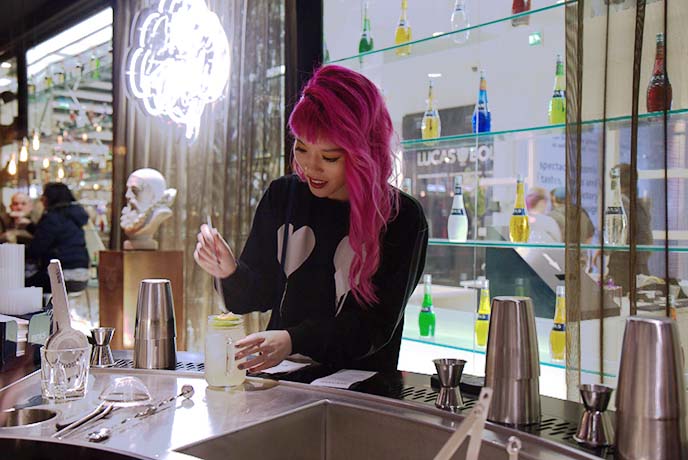
Time to shake, shake, shake! I had never made a professional cocktail, and it was fun to test out various recipes using jiggers (the measurement device) and shakers.
Visitors can also come here for group cocktail-making lessons, or book a Bols tastings or food pairing.
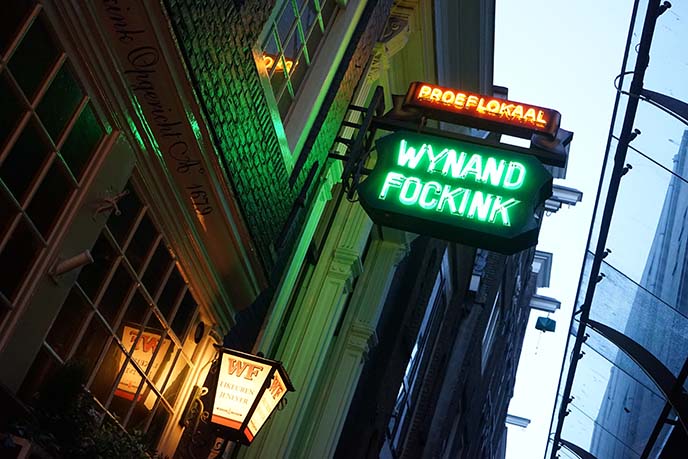
On another evening, we tried a variety of spirits at Wynand Fockink, a Dutch tasting tavern (proeflokaal). Established in 1679, this is the oldest tasting room and distillery in the city.
The bar is located not far from the Red Light District (address: Pijlsteeg 31 & 43, Amsterdam, Holland).
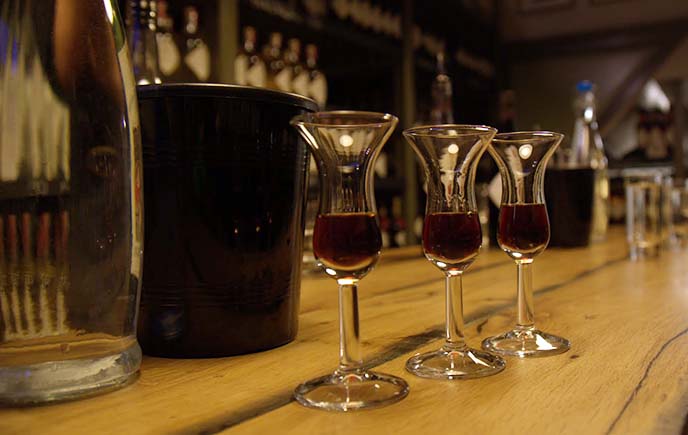
We took part in a tasting session, but you can also walk into the adjoining Wynand Fockink bar any time for a drink. It retains the 17th century atmosphere, and serves the liquors in the traditional fashion: filled to the top, in a tulip glass.
The “proper” way to take your first sip is by putting your hands behind your back, leaning over, and slurping the head off the top. Not even the royal family can get out of bowing to the drink — if you try to pick it up, you’ll inevitably spill it!
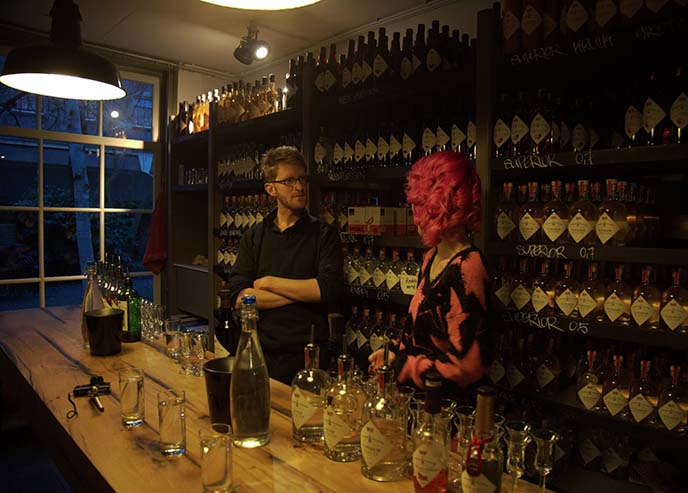
We tasted a variety of liqueurs and genevers, which are still made using the same 17th century traditional craft methods. The Dutch distillery produces more than 70 varieties in small batches, which preserves the high quality of the product.
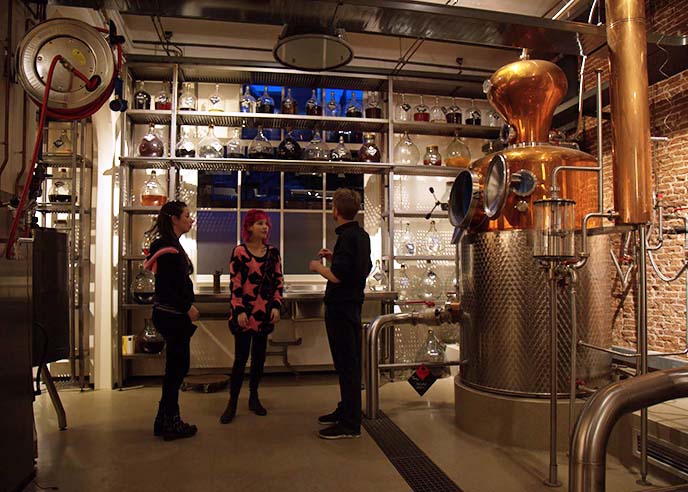
Our guide took us into Wynand Fockink’s distillery — which had a “Breaking Bad” vibe! There were rows of flasks, filled with fruit and herb infusions. Everything is hand-brewed in this small space, just as it was centuries ago.
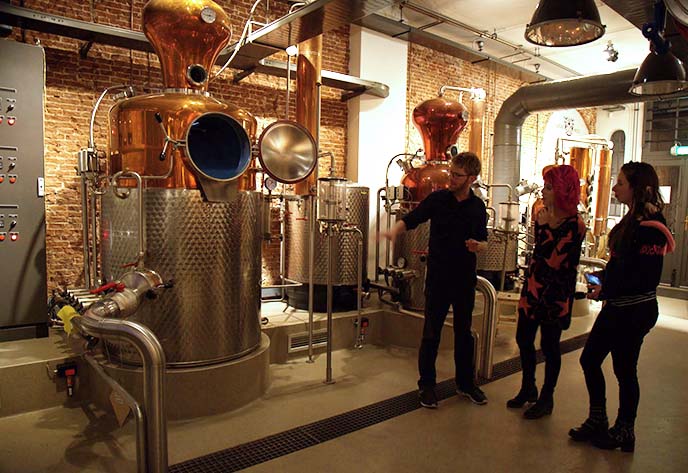
The equipment has been updated (and has a steampunk look), but the process of making these traditional Dutch liqueurs is exactly the same.
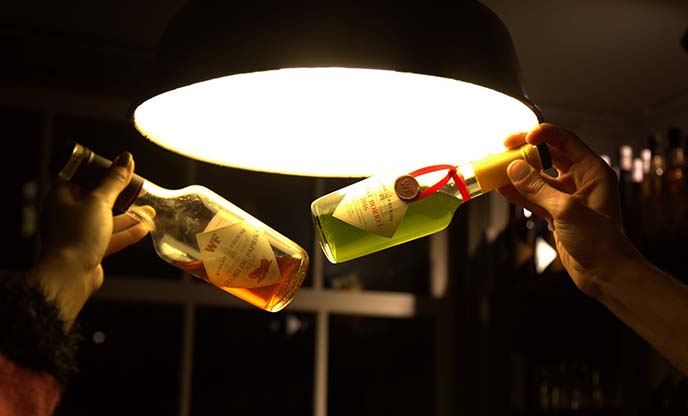
Back in the tasting room, our guide entertained us with stories about the spirits while we tried them. For example, the Dutch would historically serve “Naked Belly Button Liqueur” at parties, where a pregnant mother would show her growing belly!
Wynand Fockink is not afraid to experiment with limited-run flavors. They created a pine-infused Christmas tree one during the holiday season, and a charred red pepper flavor that was unexpectedly delicious. (We picked up a few flavors at their candlelit shop next door).

I hope you enjoyed this first taste of Amsterdam! Coming up, there’s a visit to the Miffy store and more… stay tuned.
PS: If you’re a museum-lover like me, I highly suggest you pick up the I Amsterdam City Card, which is what we used during this trip. It’s an unlimited travel pass for 1, 2 or 3 days, with tons of benefits.
The IAmsterdam card includes free public transport and entry to all the major attractions, including quirky museums and canal cruises. The perfect way to maximize your visit, and visit tons of places for a much lower price than if you bought individual entry tickets.
SHARE & COMMENT
Visiting the Miffy Museum in Utrecht, Netherlands! Nijntje Pleintje statue, traffic lights & Schiphol airport shops.
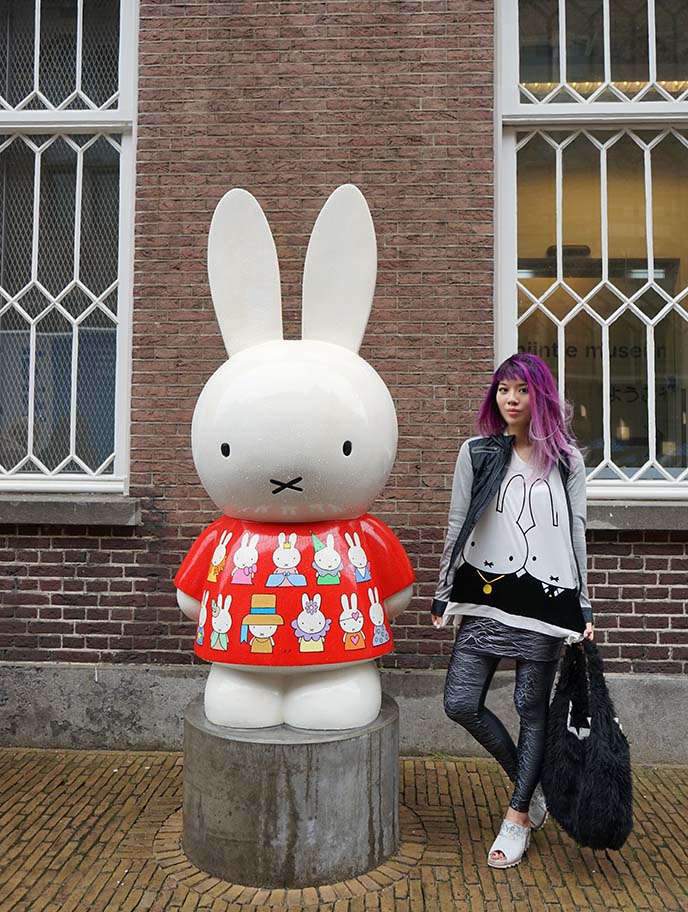
As a hardcore Miffy fan, it was a dream come true… to visit the Miffy Museum in Utrecht, Holland!
The recently-opened Nijntje Museum is dedicated to the X-mouthed bunny (that’s her name in Dutch). I took advantage of a brief Netherlands stopover to visit with Leyla, my fashion blogger and vlogger friend (who made a video of the trip on her LeylaFashion YouTube.)
Get ready for Miffy Madness. We’ll take you inside each room of the museum, as well as the Nijntje Pleintje plaza, traffic lights crossing, and gift stores dedicated to this adorable mascot!
(Update – I now have a travel guide to Miffy shops in Amsterdam, Netherlands too! It covers De Winkel Van Nijntje, Mr Maria and more.)
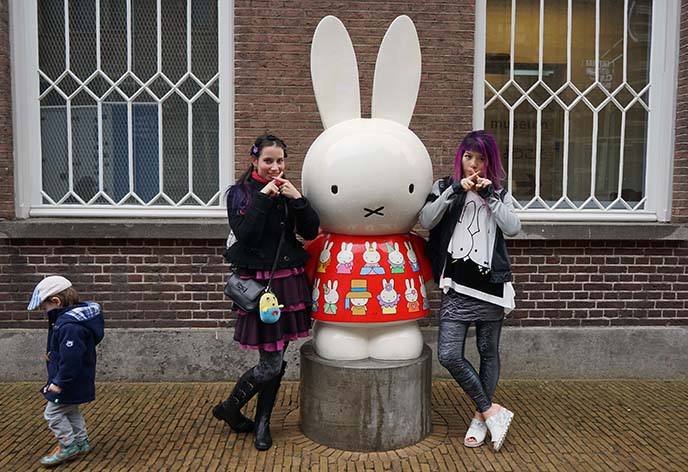
We couldn’t resist posing with X-fingers to mimic her mouth. However Leyla’s son, Danny, seems ready to go inside…
Address and directions: The Miffy Museum is located at Agnietenstraat 2, 3512 XB Utrecht, Netherlands. Utrecht is the hometown of her creator, illustrator Dick Bruna, and a 30 minute train ride from Amsterdam. The museum is open every day except Mondays, from 10am to 5pm.
How to get here by train: I came straight from my stopover in Schiphol Airport (Amsterdam). I rode the train — track 1 or 2, direction Heerlen or Nijmegen — and arrived in half an hour at Utrecht Centraal Station. From there, you can walk 15-20 minutes or take a short bus ride. You can also come here direct from Amsterdam Central or any major station.
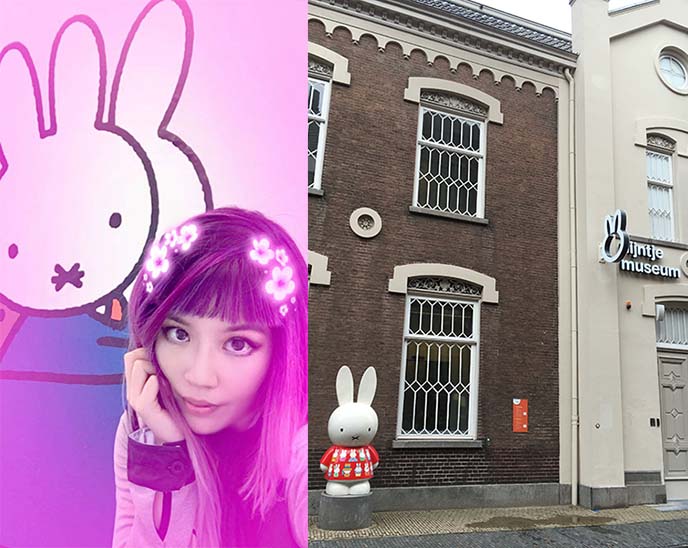
When you arrive, look for the giant statue of Miffy in a red sweater, and the sign “Nijntje Museum” next to a light-up outline of her head.
Earlier in 2016, the museum reopened after a significant renovation. Now, the two-level building brings Miffy’s universe to life, with colorful and interactive displays for kids and adults.
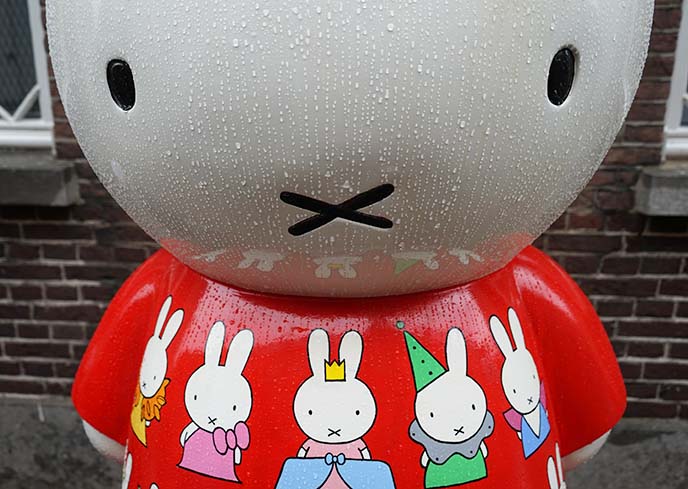
The human-sized statue is from the Miffy Art Parade in 2015, a project that celebrated her 60th anniversary.
Sixty artists decorated a gargantuan Miffy statue, in a variety of styles ranging from creepy Goth to rubber ducky. (There are photos of these statues at the end of this post, so keep reading). The works went on display all over the Netherlands and Japan.
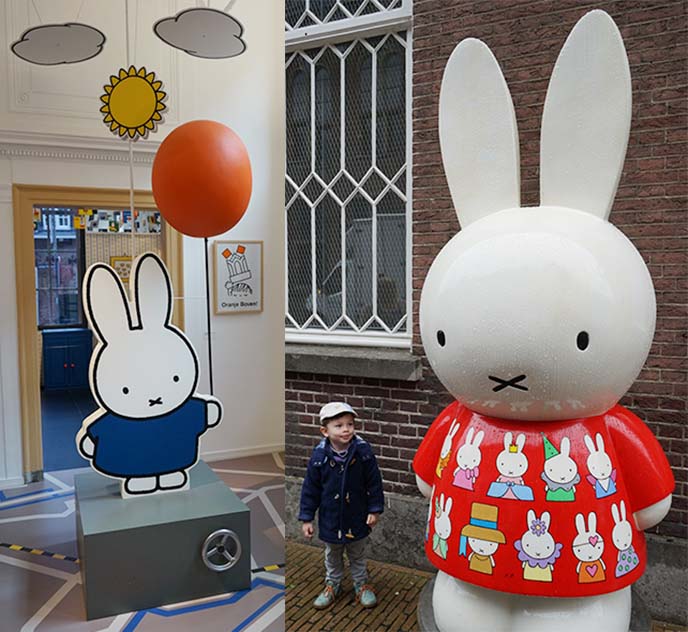
Many people mistakenly think that Miffy is Japanese, because of her “kawaii” and minimal look. In fact, she’s Dutch and older than Hello Kitty. (Sanrio even got sued for copying her design; the court ordered them to discontinue their “Cathy the bunny” character.)
Her name, Nijntje, is a shortening of “konijntje,” which means “little rabbit.” Dick Bruna released his first bunny book in 1955, followed by over 30 more. She’s also the face of many fashion and home good products – shop a selection below.
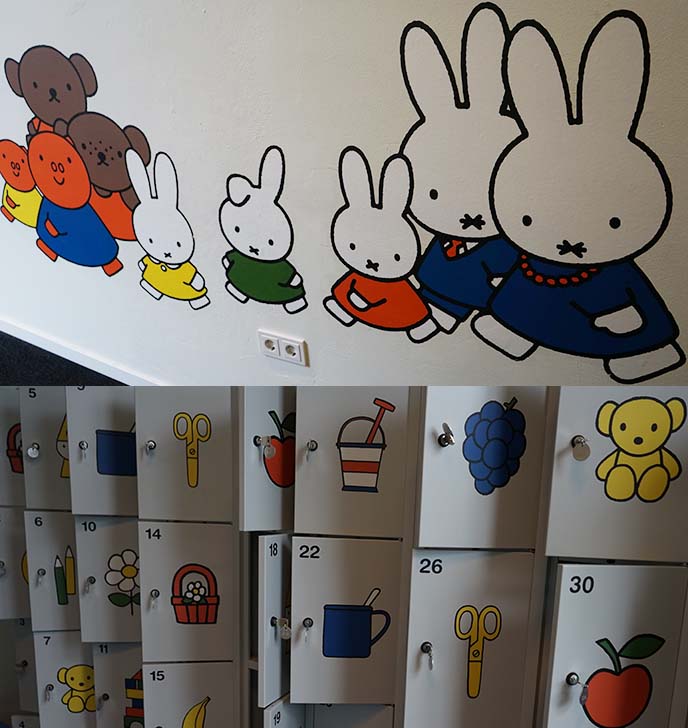
Dick Bruna’s storytelling and bright drawings have proved to be timeless. Even today, children are charmed by the Miffy universe he created — including her family, Grunty the pig, and Boris the bear.
The Nijntje Museum puts his deceptively simple illustrations front-and-center. For example, the lockers are decorated with different drawn objects, for easy remembrance.
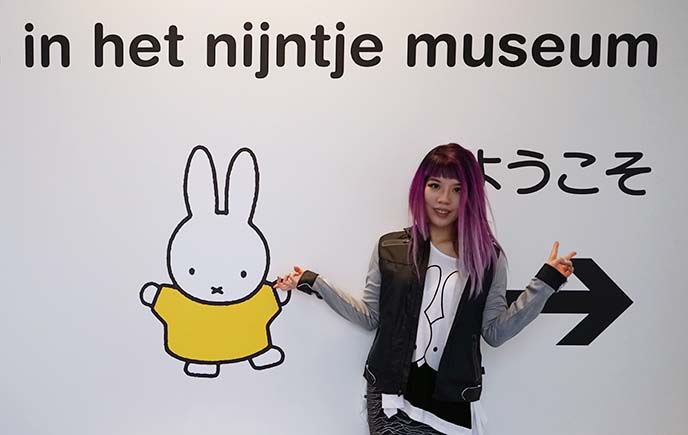
The Japanese characters spell out “yokoso,” or welcome — because visitors from Asia (especially Japan) are plentiful!
People from all over the world are flocking over to see Miffy’s museum, which has quickly become one of Utrecht’s most popular attractions. I recommend getting tickets online in advance, and arriving early to avoid crowds (doors are open from 10am to 5pm, Sunday to Tuesdays).
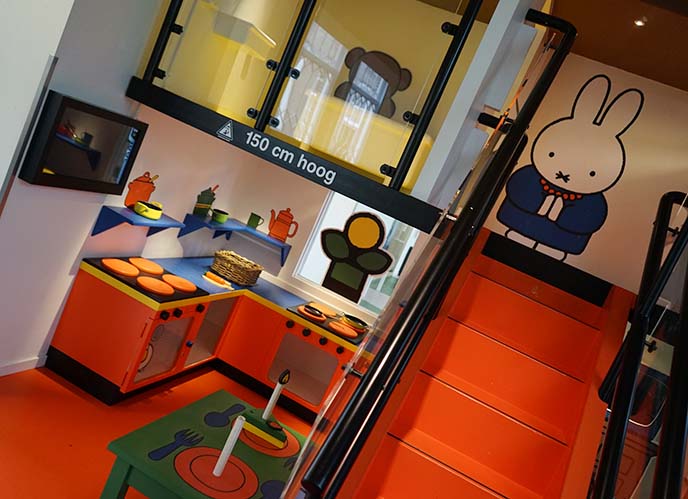
The Miffy Museum is designed as a series of magical miniature worlds. There are 10 rooms, which look like scenes from the picture books come to life.
In this one, her star-mouthed mother stands over the family kitchen. Children can pretend to cut vegetables, cook, and even climb through the cabinets.
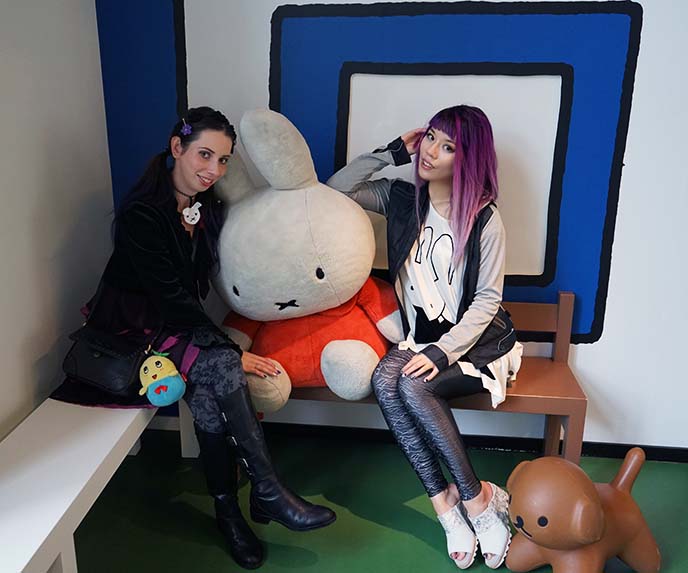
There are all sorts of interactive displays for fans of all ages. Leyla and I snuggle up to the plush bunny and Snuffy the dog.
(PS: I’m selling some of my Miffy fashion and accessories here; email me if you’d like anything! My sandals are this Joanie Mule by Sorel Footwear.)
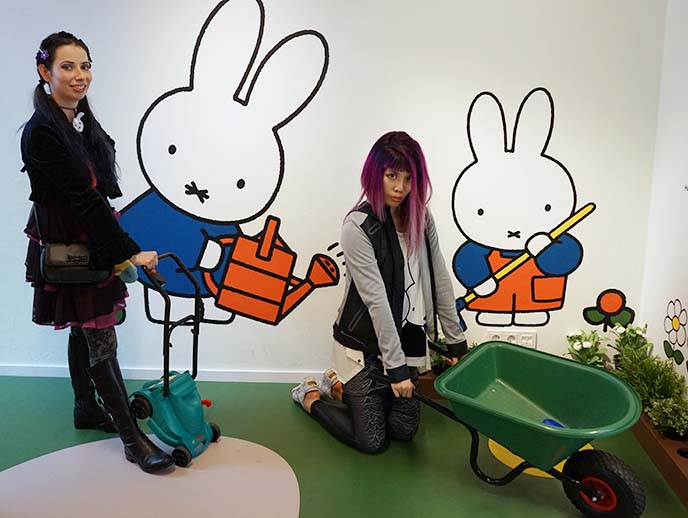
The museum’s displays encourage you to “play house” and let your imagination roam free.
We helped Miffy work in the garden. I must have done something wrong because her dad seems to be watering me with his can…
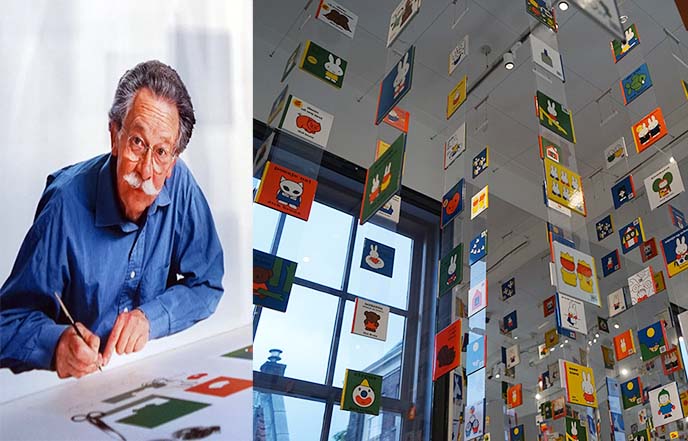
I’ve been a Miffy obsessive for years, but I developed a deeper appreciation for artist Dick Bruna after seeing his full oeuvre.
The museum’s figurehead is his white bunny, his most popular creation (her books are translated into 50 languages and sold more than 85 million copies).
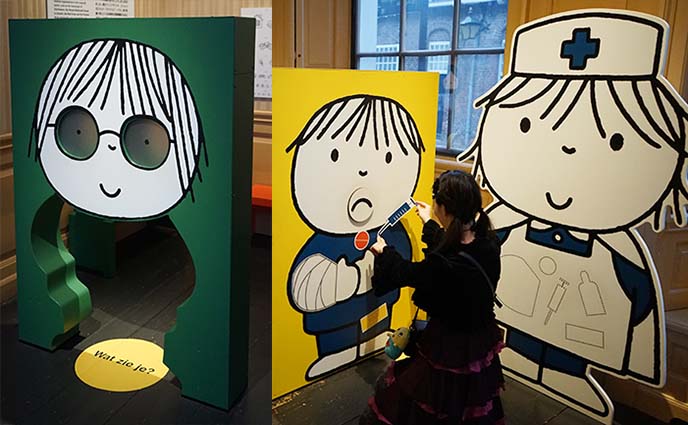
However, Dick Bruna wrote more than 100 other picture books for children, and also did graphic design for organisations including hospitals. I got to see these lesser-known yet equally impressive works for the first time.
Dick Bruna is known to be a very kind man, and his children’s books promoted the acceptance of everyone, including those who are different or disabled — very progressive themes for his time. This room encouraged children to help others in need of medical treatments.
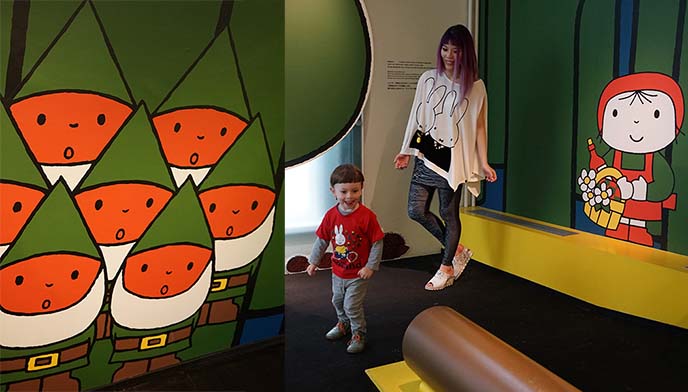
Dick Bruna was inspired by Matisse, and his works are tied together by simplistic forms and blocks of primary colors. This room shows his interpretation of Snow White and the Seven Dwarfs. (Danny loved running up and down the ramp!)
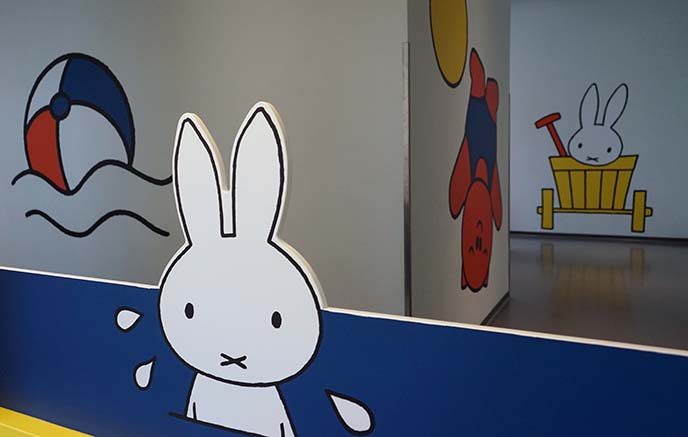
As we moved through the rooms, we got to see Nijntje’s evolution. In the first books, she looked a plush toy with floppy ears. From the 1960s onward, her face got rounder and her ears stood up.
The rabbit’s simple look and narratives are key to her appeal: anyone can project their imagination onto her. In my case, she’s a creepy-cute minimal Goth icon with her mouth sewn shut, hence the X!
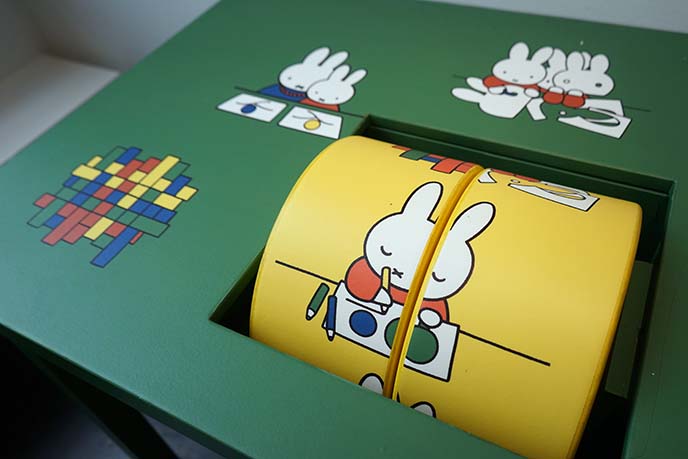
Dick Bruna always portrayed Miffy as a regular little girl with universal experiences such as making a new friend (the brown bunny Melanie), or suffering the death of a grandmother.
The museum is full of play areas: matching games, puzzles, funhouse mirrors. As Bruna said in an interview, “The most difficult thing is keeping it simple, to leave plenty of room for the child’s imagination.”
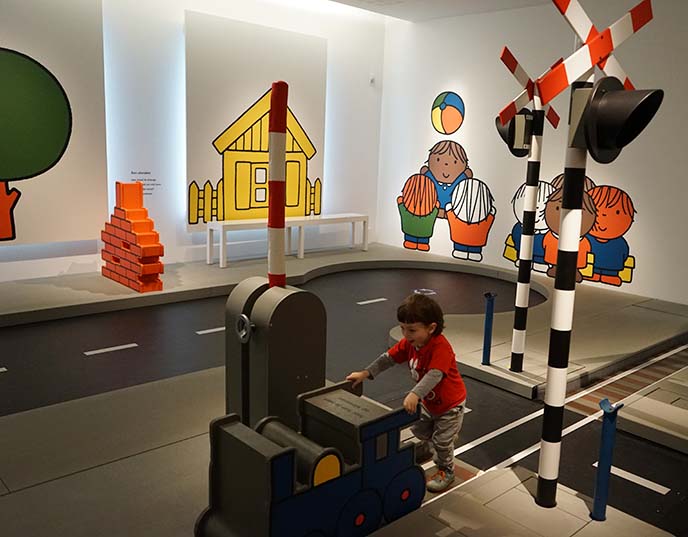
Danny fell in love with this spacious room, beautifully designed with cars and trains that you can push or ride.
Bruna’s world keeps children engaged while helping them learn. He wrote a book about safely crossing the road, illustrated in minimal orange and grayscale.
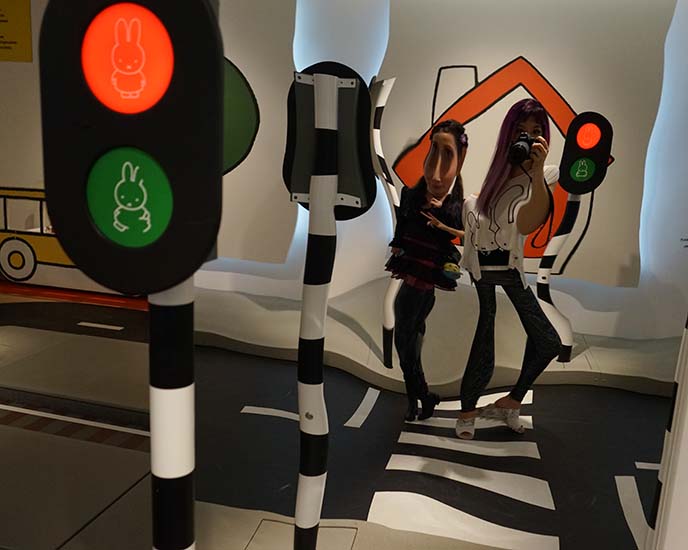
But as you can see from our funny Instagram shuffle... navigating roadways is a lesson for all ages!
(There’s actually a working Miffy traffic signal, in Utrecht. Keep scrolling down to see the real deal.)
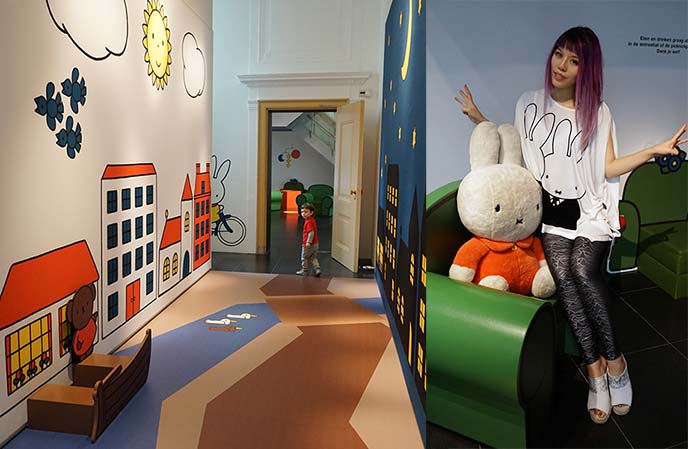
Whether you’re a toddler or grown-up, you can’t help but smile as you explore the Miffy Museum. Her world is all about creativity, positivity and imagination — expressed in bold primary paints and outlines.
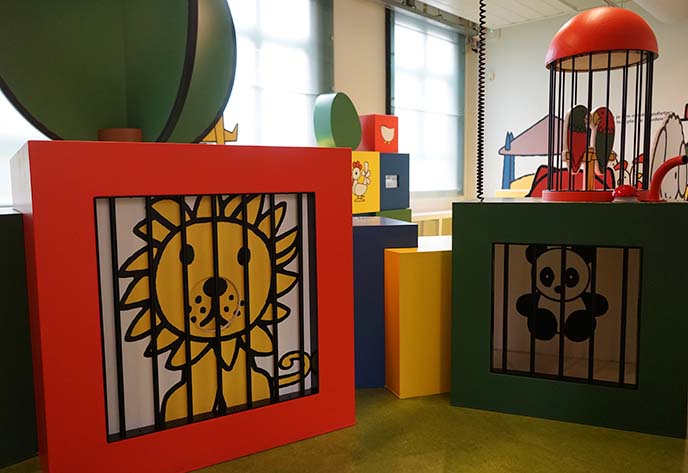
On the upper level, there’s a space that represents a zoo and farm. These two parrots repeat your words when you speak into a microphone. Danny loved crawling through the cages and going down the slide.
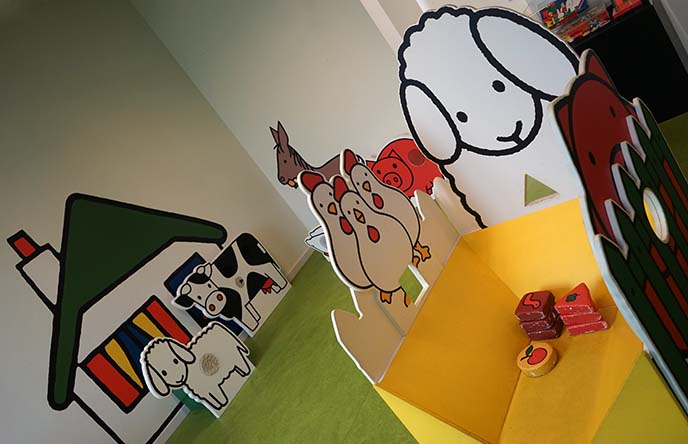
Dick Bruna has a genius for conveying the essence of an animal, with only a few brushstrokes. His simple forms add up to a warm, minimal style that’s unmistakably his own.
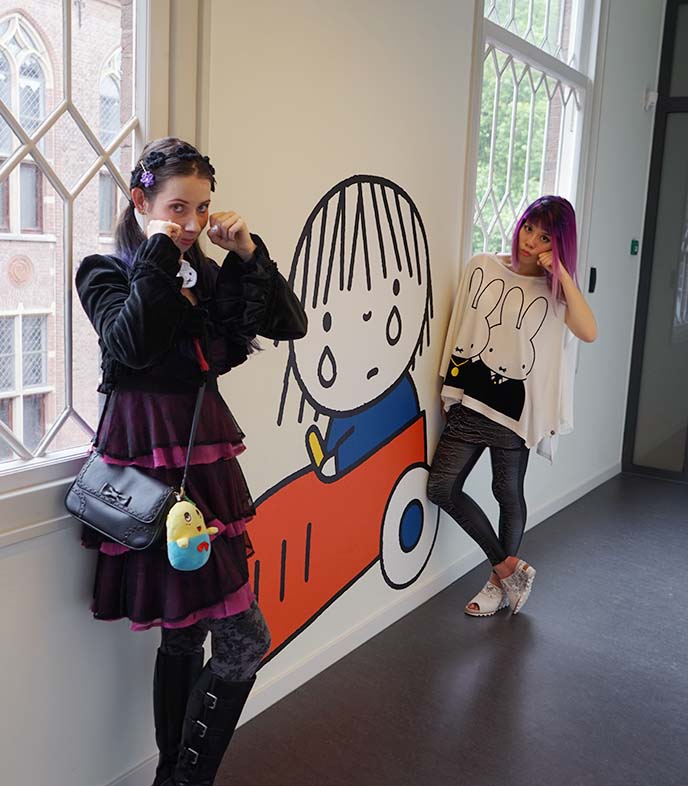
The only negative about the Nijntje Museum… It’s hard to say goodbye! Leyla and I felt like this crying child, when it was time to go. We’ll simply have to come back again soon.
(My Miffy top is for sale on my Depop shop, and my shoes are the Sorel Joanie Mule.)
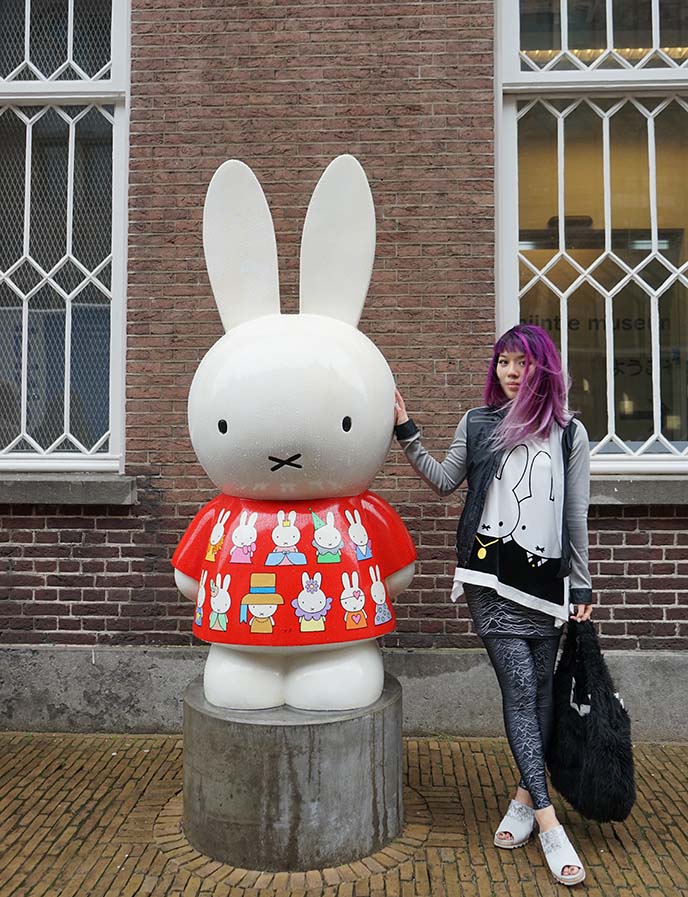
Thankfully, there are more Miffy sights to see in Utrecht, making it the ideal day trip from Amsterdam.
Right across the street from the statue is Centraal Museum, which features a range of artwork including by locals.

In the atelier of Centraal Museum, you’ll find an exact replica of Dick Bruna’s studio. Everything from his original workshop has been set up here, from his drafting table to a modern chair in primary colors.
The circular painting shows his simple yet powerful design of the black bears (zwarte beertjes).

I watched a fascinating video of Dick Bruna at work. To this day, he continues to draw with brush and ink: it takes many precise strokes to create the seemingly simple X of Miffy’s mouth. The slight shake in the hand-drawn forms results in what he calls “a line with a heartbeat.”

Dick Bruna always appreciated his fans, and kept displays of the mementos that they sent him. The studio let us get a closer look at his creative process, and I recommend visiting Central Museum too (it’s just across the street from the Miffy Museum).

You can’t leave Utrecht without seeing Miffy’s crosswalk. The bunny shows up as the pedestrian traffic signal: red for “Don’t Walk,” and green for “Go.”
Look for the rainbow colored crossing called ‘Regenboogzebrapad’, and you’ll find her directing traffic. (Location: it’s in front of the shopping mall at St Jacobsstraat 1A, 3511 Utrecht, Netherlands.)

A short walk away is Nijntje Pleintje, a dark Miffy statue created by Dick Bruna’s son, Marc Bruna. (Address: 1e Achterstraat 1, 3512 VL Utrecht, Netherlands).

Nijntje Pleintje is located in this little grassy square, at the beginning of the Van Asch van Wijckskade. It looks like a flat, black metal, cut-out Goth version of the bunny — which matches our style rather well.
(You’ll laugh when you see the Boomerang Instagram video we did, next to this statue!)

But wait — how can you take Miffy home with you? There are several Netherlands gift stores that you can’t miss — they even have vampire Gothic versions of the bunny. Keep reading the rest of the story below…


 LA CARMINA
LA CARMINA






